Macular Degeneration
What is macular degeneration?
Age Related Macular degeneration (AMD) is a disease that affects central vision. It is caused by oxidative damage to the retina resulting in the buildup of cellular waste causing gradual and patchy damage to the central retina (the macula). The macula is responsible for your detailed vision so damage to this area affects your ability to see detail. About 90% of cases are “dry” or atrophic, and 10% of cases are “wet” or neovascular. The latter causes rapid and severe vision loss if not treated quickly.
If you’re concerned about age-related macular degeneration, Mission Eye Care can help. We have specialized equipment for the early detection of this disease as well as the expertise and knowledge to discuss modifiable risk factors such as diet and lifestyle. You can read more about nutrition and AMD in our blog section.

Symptoms of macular degeneration
Symptoms of macular degeneration are specific to the type of AMD that you have. There are 2 types of AMD: Dry AMD and Wet AMD.
Dry AMD Symptoms
- gradual patchy loss of central vision that does not improve with glasses
- late stage AMD can cause complete loss of central vision
Wet AMD Symptoms
- rapid vision loss, usually in one eye, along with distortion of straight lines
- Wet AMD indicates bleeding under the retina and requires urgent referral to a retina specialist for treatment to prevent further vision loss.
Both forms of age-related macular degeneration are very rare under the age of 50 but the incidence increases exponentially with age.
Who is at risk of developing macular degeneration?
Some risks are genetic (non-modifiable) and others are environmental and can be modified.
Non-modifiable AMD risk factors include:
- Being female
- Having fair skin and light eye color
- Having moderate to high myopia (near-sightedness)
- Having an immediate family history
- Advancing age
Environmental AMD factors include:
- Smoking, past or present
- Lifetime UV exposure (especially when young)
- Poor cardiovascular health
- Poor diet and nutrition
These modifiable factors can contribute to progression because they lead to oxidative stress which ultimately damages the sensitive structures in the macula.

Macular Degeneration Treatment
Wet AMD Treatment
Wet AMD treatment involves periodic painless injections done by a retina specialist at regular intervals from 4 to 12 weeks apart, depending on severity. The goal of treatments is to prevent further vision loss but in some cases, vision can improve slightly following treatment.
Dry AMD Treatment
A healthy lifestyle, diet and vitamin supplements are the only means to slow the progression of dry AMD. There are new experimental treatments using electric microcurrents and light based photobiomodulation but they are as yet unproven.
Vitamins for Dry AMD
The largest study ever conducted on the efficacy of vitamin supplements and AMD is the AREDS (Age Related Eye Disease) study. It is the only evidence-based long-term study of nutritional supplements to treat dry AMD. Unfortunately, the majority of AREDS vitamins contain high levels of Zinc. High-dose Zinc has been implicated in some studies as contributory to a number of health issues, particularly with the genitourinary system. Furthermore, it was noted that AMD progressed faster in some patients who were supplementing with zinc. We now know that some people are genetically predisposed to this type of progression and should NOT be taking added Zinc. Although there are genetic tests to determine this predisposition, we instead recommend supplements such as MacuHealth and Early Defence which are low in Zinc and also contain all 3 of the macular carotenoids shown to be protective against AMD.
We have an in-office nutritional survey you can fill out to see if you are getting adequate intake of these nutrients, and if supplementation may be of benefit. Based on your risk profile, your optometrist can discuss appropriate preventative strategies. If you have AMD, you may be sent home with a nutrition or supplement plan, along with an “Amsler Grid” to monitor for any changes at home. If you have a family history or are concerned about AMD, book an eye exam so we can assess your risks and go over our findings and recommendations.



